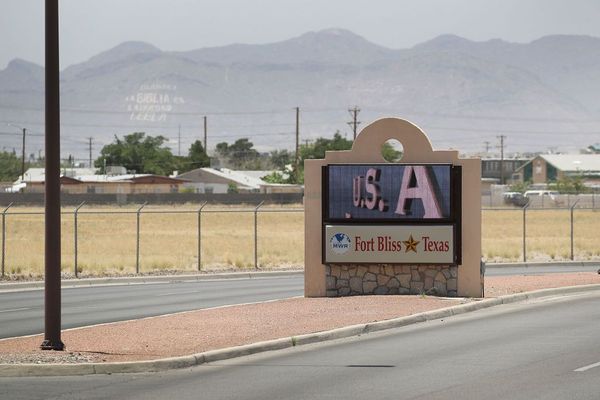WASHINGTON _ New Hampshire is the one that got away in 2016 for President Donald Trump. It could be the state that counts the most in 2020.
A mere 2,736 votes kept Trump from capturing New Hampshire in the previous general election. Although Trump won overall with 306 electoral votes, the loss of the northeastern state stayed with the competitive politician and his team.
This time, the Trump campaign is investing earlier in the state, believing he can win New Hampshire's four electoral votes with a stronger effort.
In what is anticipated to be a close election, New Hampshire could decide the election, say state political experts who vividly remember that in 2000 if Al Gore hadn't lost the state to George W. Bush, the Democratic statesman would have become president.
"We're going to work as if we are the tiebreaker," Chris Ager, the new Republican National Committee representative for New Hampshire told McClatchy.
Were the president to lose a combination of states such as Wisconsin and Florida, Ohio and Pennsylvania, or Wisconsin, Michigan and Arizona, it could be that New Hampshire ends up being Trump's last hope of holding onto the Oval Office.
As the Democratic presidential candidates descend on New Hampshire for the primary, Trump is already making early investments in the battleground state for the general election.
The Republican National Committee has 12 full-time staffers in the 10-county state who have trained more than 760 campaign volunteers at 60 sessions for this election cycle, RNC spokeswoman Ellie Hockenbury said. The national party at its winter meeting in Miami announced a staff expansion, including for New Hampshire.
Ager said he has never seen so many RNC staffers in the state nine months out from a general presidential election. The Republican with 30 years of experience in politics said the investment shows confidence in Trump's ability to carry the state in 2020.
Former Trump campaign manager Corey Lewandowski, a New Hampshire resident, recalls a total of 40 aides working on Trump's campaign nationwide at this point in the race four years ago. He said the campaign was so lean at the time that it had to leave New Hampshire as soon as the primary concluded.
"There was no ability to leave people there. And now there's probably 700 people who work at the campaign," said Lewandowski, a senior advisor to the president's reelection team.
Trump won New Hampshire's Republican primary four years ago _ the political novice's first victory in a string of statewide triumphs. For that reason, the state is special to him, campaign sources told McClatchy, and he would like to add it to his win column this election cycle.
"The electoral college is close enough that New Hampshire's four votes really can make or break a campaign. I have really strong memories of the year that Al Gore lost the presidency," said James DeMers, a Democratic activist in New Hampshire and a former state representative.
"Democratic presidential politics today continues to look at New Hampshire and realize that little state could be the margin of victory, if this is another tight election," he said.
LESSON LEARNED
The Democratic National Committee is also planning to invest heavily in battleground states that Trump won, New Hampshire Democratic Party Chairman Ray Buckley said. "But just in case, we will make sure that New Hampshire is a firewall for the Democratic nominee."
He also recalled Gore's unexpected loss to Bush in the state and that Gore did not target New Hampshire, where he had just two employees working for him _ one of them was Buckley.
Every Democratic nominee since has made a significant investment in the state. "The lesson of ignoring New Hampshire, I believe, has been learned," Buckley said.
A spokeswoman said the New Hampshire Democratic Party already has about two dozen staffers and estimates the staff numbers for the Democratic presidential campaigns in the state to be well over 400. It is unclear how much of that staff will remain in the state after the primary.
In a nod to the state's importance in 2020, Trump this month will hold his second rally there in six months.
"We should have won New Hampshire. That was taken away," Trump said at an August rally in the state. "We did great in New Hampshire. We should have done great in New Hampshire."
Trump says he lost the state due to voter fraud, an unsubstantiated claim. Lewandowski said it was not fraud, because the law allowed anyone who said that New Hampshire was their state of residence for the foreseeable future to vote in the state.
A law that will affect voting in New Hampshire for the first time in 2020 could force prospective voters to meet certain residency requirements. It has been the subject of litigation in the state.
Zelt Communications founder Lauren Zelt, an advisor to the New Hampshire GOP in 2014, said the president must "make an appeal to the suburban, white collar voters" in order to beat the eventual Democratic presidential nominee in the general election.
He must do well in two counties in particular _ Rockingham and Sullivan, she said. Rockingham, the second-most populous county in the state, is an area where GOP candidates have traditionally run up the score. Sullivan, a county in which Trump prevailed, previously voted for former President Barack Obama.
Hockenbury said the RNC will focus its voter turnout efforts on counties that Obama won but voted for Trump in 2016 like Sullivan and Hillsborough. If Trump had performed as well as former Republican Sen. Kelly Ayotte in Hillsborough County in 2016, he would have won the entire state.
The vice president's wife, Karen Pence, is holding an event in Nashua this week. Trump is holding his next rally on Feb. 10 in Manchester. Both cities are in Hillsborough.
'TROUBLED REPUBLICANS'
DeMers said he sees signs of voter depression, however, among Republicans in the state who are unimpressed with Trump's leadership.
"Trump's got problems all over New Hampshire. This has the potential of not being anywhere near as close as the election of 2016. But look it's still going to depend on who the Democrats nominate," said DeMers, who is supporting Joe Biden in his party's primary. He is hopeful for a Democratic nominee "who independents and even those troubled Republicans feel that they can cast a vote for."
Jennifer Horn, the chairwoman of the New Hampshire GOP during the 2016 presidential election, is one of the "troubled Republicans" that DeMers referred to. She co-founded a group that advocates for the defeat of "Trump and Trumpism" at the ballot box, known as The Lincoln Project.
"I think he's very, very vulnerable here," she said of Trump's ability to win her home state. "I certainly don't see where that win comes from for him."
Horn identified right-leaning independents and suburban women as weak points for Trump. She pointed to data from the New Hampshire Secretary of State's office that shows 20,284 people have left the Republican Party since Trump won the presidency, which is roughly 7,000 more than the 13,556 voters Democrats lost.
"The president has not just disenfranchised good Republicans who feel passionately about principle and integrity and character, he has conducted himself in office in such a corrupt manner, people who left the party in 2016 have been given no reason to return to the Republican Party," she said.
Listing his critics' chief complaints, including proposed investigations of his political opponents and his administration's policy of separating children from their parents at the border, she said, "I don't think that there's enough money for a campaign to spend to hide that for people."
Roughly 10,000 fewer people are registered to vote in New Hampshire now than two years ago. It is not entirely clear where those voters went. Some passed away, some moved away and others changed their registration to undeclared, the New Hampshire secretary of state's office said.
There are now 3,807 more undeclared voters than there were on Nov. 8, 2016. The rise in undeclared, or independent voters, "should be concerning" to Republicans, said DeMers, because they are losing registrations at a much quicker pace than Democrats.
On Election Day in 2016, the GOP had 20,000 more registered voters than Democrats. At last count, on Dec. 31, 2019, the gap was 13,272.
It could narrow even further after New Hampshire's competitive Democratic primary on Feb. 11. The state allows voters to switch their party affiliation on site before they cast a ballot. They can change it again on their way out.
The state allows same-day registration, making the November general election winner tougher to predict than polling would suggest.
"A sizable number of people who were not expected to vote decided to vote on that day and skewed all public and private polls that were being done of New Hampshire," Buckley said of 2016. "Our grassroots were able to withstand that shift, unlike so many of our sister states in similar swing challenges."
He added, "Where they all fell, we were able to hold on."







